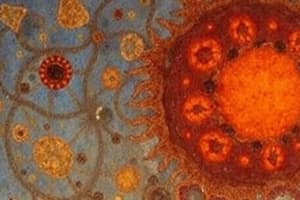Podcast
Questions and Answers
What is the primary function of the mitochondria in a cell?
What is the primary function of the mitochondria in a cell?
- Transport proteins to different parts of the cell
- Store genetic material
- Synthesize ribosomal RNA
- Produce ATP through cellular respiration (correct)
Which organelle is responsible for directing cellular activities?
Which organelle is responsible for directing cellular activities?
- Mitochondria
- Golgi Apparatus
- Lysosomes
- Nucleus (correct)
What is the primary function of the endoplasmic reticulum (ER)?
What is the primary function of the endoplasmic reticulum (ER)?
- Storage of genetic material
- Protein synthesis and lipid metabolism (correct)
- Transport of nutrients
- Production of ATP
Which organelle is specifically involved in the synthesis of ribosomal RNA?
Which organelle is specifically involved in the synthesis of ribosomal RNA?
What is the role of lysosomes in a cell?
What is the role of lysosomes in a cell?
Which of the following best describes the cell membrane's function?
Which of the following best describes the cell membrane's function?
What distinguishes eukaryotic cells from prokaryotic cells regarding organelles?
What distinguishes eukaryotic cells from prokaryotic cells regarding organelles?
What is the main function of ribosomes in the cell?
What is the main function of ribosomes in the cell?
What is the primary function of lysosomes in a cell?
What is the primary function of lysosomes in a cell?
Which component of the cell is responsible for sorting and packaging cell products?
Which component of the cell is responsible for sorting and packaging cell products?
What role do microtubules and microfilaments play in the cell?
What role do microtubules and microfilaments play in the cell?
What can occur if lysosomes break open and release their enzymes into the cytoplasm?
What can occur if lysosomes break open and release their enzymes into the cytoplasm?
Which organelle is described as the 'electric company of the cell'?
Which organelle is described as the 'electric company of the cell'?
Which of the following statements about ribosomes is true?
Which of the following statements about ribosomes is true?
Flashcards are hidden until you start studying
Study Notes
Overview of Organelles
- Organelles are essential structures that enable cells to live, grow, and reproduce.
- Function in a coordinated manner regulated by intricate mechanisms ensuring proper functioning within the cellular system.
- Membrane-bound organelles are exclusive to eukaryotic cells, enclosed by a phospholipid bilayer membrane isolating their internal environment from the cytoplasm.
Key Organelles and Their Functions
-
Nucleus:
- Cell's control center, directing various cellular activities.
- Serves as central storage for genetic material, including DNA.
-
Mitochondria:
- Known as the powerhouse of the cell.
- Responsible for ATP production via cellular respiration.
-
Endoplasmic Reticulum (ER):
- Comprised of interconnected membranes involved in protein synthesis and lipid metabolism.
- Two types:
- Rough ER (RER): Engaged in protein synthesis and modification.
- Smooth ER (SER): Involved in lipid metabolism, detoxification, and calcium ion storage.
-
Golgi Apparatus:
- Functions as the cell's packaging house, sorting, modifying, packaging, and distributing proteins and lipids.
-
Lysosomes:
- Act as "garbage men," digesting food particles and worn-out cell parts.
- Contain digestive enzymes that degrade biomolecules and protect the cell by digesting foreign invaders.
- Can lead to apoptosis if enzymes leak into the cytoplasm.
-
Peroxisomes:
- Specialize in digesting toxic substances within the cell.
-
Ribosomes:
- Serve as factories for protein synthesis.
- Formed from ribosomal RNA (rRNA) in the nucleolus and participate in mRNA translation into proteins.
-
Cytoskeleton:
- A network of protein filaments (microtubules and microfilaments) aiding in cell movement and structural integrity.
Cell Membrane
- Functions as a gatekeeping structure, regulating and controlling the movement of substances in and out of the cell.
- Composed of phospholipids, it allows essential nutrients to enter and wastes to exit the cell.
Analogies for Organelles
- Cell Membrane: Gate to the city; controls entry and exit.
- Nucleus: Mayor's office; central decision-making and information storage.
- Ribosomes: Factories of the cell; sites of protein production.
- Endoplasmic Reticulum: Roadway of the cell; facilitates transport within the cell.
- Lysosome: Garbage men, police men; cleans up waste and protects against invaders.
- Mitochondria: Electric company of the cell; provides energy for processes.
Studying That Suits You
Use AI to generate personalized quizzes and flashcards to suit your learning preferences.




